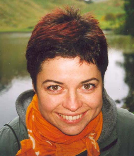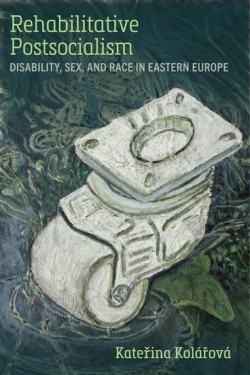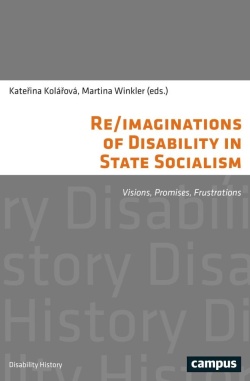
Office: 2.39
e-mail: katerina.kolarova@fhs.cuni.cz
tel.: 224 271 450
Kateřina Kolářová received her PhD in Anglo-American Literary Studies and an MA in History and English and American Studies and History from Faculty of Arts, Charles University in Prague (research and study stays: Freie Universität Berlin, Universität Konstanz, Studienkolleg zu Berlin)
Feminist Queer Crip theories and methodologies,
Disability studies
Feminist Transnationalisms
Postsocialism, Postcoloniality and Decolonial critiques
Social studies of Medicine
Environmental humanities
Postsocialism and cultural and social transformations
Methodologies of Intersectionality, and intersectional Research,
Microbiopolitics, and More-than-human ontologies
Rehabilitative Postsocialism: Gender, Sexuality, Disability, Race in Eastern Europe, Ann Arbor: The Michigan University Press, forthcoming in 2025
Tobin Siebers Prize 2019
https://press.umich.edu/Books/R/Rehabilitative-Postsocialism2
Rehabilitative Postsocialism names disability, sexuality, and race as central yet invisible to negotiations of the postsocialist consensus. Kolářová presents postsocialism as an analytic that should be brought to bear to understand cultural politics, economic formations, and state politics through the present day.
Drawing from a rich and varied archive, Rehabilitative Postsocialism maps the formation of new structures of inequalities and social imaginaries of wellness, merit, and justice in order to understand current articulations of global disenchantment with democracy, social justice, and solidarity. The book also makes clear that disability, race, and ethnicity continue to circulate in depictions of Eastern Europe as suspended in a chronic developmental “delay.” Rehabilitative Postsocialism both situates this positioning within its political and historical formation and offers the analytical tools to challenge its continued deployment.

Podcast Studio Porucha: O životě lidí s “jinakostí” v “normálním” světě, ve kterém nabouráváme témata “jinakosti” a “normality”.
Přestože velká část z nás má s jinakostí, nebo postižením, zkušenost vlastní, či přenesenou skrze naše blízké, lidí, které máme rádi, žijeme s ni a blízko nich – tzv. postižení zůstává jinakostí, která společnost znepokojuje, děsí, a snad i odpuzuje.
Proč si většina z nás myslí, že lidé s postižením by stejně raději chtěli být „normální“, zdraví, symetričtí, stejně by raději nebyly autistkami, nežily by s chronickou bolestí, neměli by HIV, či jejich dítě by nežilo s Downovým syndromem? Proč si většina z nás myslí, že když lidé potřebují medikaci, lékařskou péči či osobní asistenci, znamená to, že jejich život je smutný, omezený, tragický, zkrátka takový, který bychom nikdy rozhodně nechtěli žít? Proč se dojímáme u filmů, které nám pořád dokola, jako trháky Million dollar baby, Hlas moře, nebo Než jsem tě poznala, vysvětlují, že je lepší nežít, než žit v těle, které se nehýbe, které potřebuje péči ostatních?

Kolářová, K., M. Winkler (eds.). 2021. Re/Imaginations of Disability in State Socialism: Visions, Promises, Frustrations. Frankfurt a/M: Campus Verlag.
In Re/imaginations of Disability in State Socialism, an interdisciplinary group of scholars examines how disability has been conceptualized and treated in socialist states throughout global history. Drawing on intersectional theories that set disability in conversation with other identity categories such as race, age, gender, and sexuality, this book offers a unique approach to this crucial issue.
How did the socialist visions of universal happiness and humanity embrace disability? How did societies that advocated all-encompassing visions of justice and, at the same time, made work a moral imperative, approach physical, mental and/or intellectual differences? How did disability arrest, transform, or tax the promises of a perfect society? And, finally, how did disability register and reveal the frustrations of such utopian visions and plans for building socialist societies? These are some of the questions raised by this book.
https://press.uchicago.edu/ucp/books/book/distributed/R/bo123166621.html

CALL FOR PAPERS
Crip and Queer Intimacies
Special issue: Text Matters: A Journal of Literature, Theory and Culture
(Issue 16, 2026)
Kateřina Kolářová, PhD (Charles University)
Katarzyna Ojrzyńska, PhD (University of Lodz)
“Intimacy is more than sex and romantic love. Intimacy is an ever-expanding universe composed of a myriad of heavenly bodies. Intimacy is about relationships within a person’s self, with others, with communities, with nature and beyond”—writes Alice Wong (10), who in her recent edited volume Disability Intimacy: Essays on Love, Care, and Desire creates a space where contributors offer insights into forty ways of looking at intimacy. Following Wong, we perceive intimacy as a quality that grows in various kinds of relationships and connections based on love, sex, desire, friendship, kinship, partnership, community, collegiality, or solidarity and often despite war, precarity, disposession, and other debilitating conditions.
We believe these reflections should not center only on Western cultures and perspectives. Nor should they be limited to private spaces and personal relationships. Therefore, we also encourage explorations of communal intimacies, drawing on what Maria Törnqvist describes as “a sociality of closeness that is bound . . . to an inclusive relational infrastructure characterized by the strength of many weak ties” (273). Importantly, crip and queer intimacies extend beyond the (inter-)human realm. We thus especially welcome proposals that explore intimate forms of companionship with more-than-human partners, including non-human animals and objects which have traditionally been denied animacy and agency.
Read more here: https://czasopisma.uni.lodz.pl/textmatters
Biological Citizenship and Chronic Embodiments: Living with HIV/AIDS in postsocialist Czech Republic
This project builds off of my explorations of neoliberal governance of (non-normative/disabled/crip) sexualities through examining HIV and AIDS as sites of individual and collective identity formation, where ‘imagined communities’ become realised as ‘imagined (biological, viral and sexual/ised) vulnerabilities’.
I am also exploring the methodological and political valences crip theory could draw from the multilayered notion of insignificance (HIV and AIDS have never achieved a level of an epidemic in the Czech republic) and relative periphery (to the global HIV/AIDS crisis). In particular, I am interested in the category of chronicity, its uses in the (local and transnational) biomedical knowledge and strategies crafted by HIV positive people (dis)identifying with/from the hegemonic knowledges of HIV/AIDS in articulations of ‘positive identity’. To contextualise discourses of chronicity against the backdrop of transnational/global political economy of health with its racialised and gendered implications, I also explore the ways in which narratives of ‘chronic positive life’, or ‘pozitude’ relate to white supremacy and create zones of exclusion.
Sympoietic Becoming: Porous Bodies in Compromised Environment
This project explores the porous boundaries of human corporeality; or how we become environments and environments become ‘us’. In particular I explore experiences of people living with inflammation, disrupted metabolism, or experiencing sensitivity and reaction to chemicals, toxins and other pollutants and the ways in which they articulate their connection to the irritants, to other (more than human) lives, and how they navigate life in bodies that they experience as extremely porous and leaky with regard to the effects of the environment.
Beyond academia
I strongly believe in the necessity to bridge university spaces with other spheres of critical work towards social justice and divesting ableist, gendered and racialised privileges. Since 2008, I have been co-organising a transnational queer film class in collaboration with Prof. Robert McRuer (George Washington University) and the queer film festival Mezipatra. I love to cooperate with artivists and art creators. Most recently, I have collaborated with the Biennale The Matter or Art, with Meetfactory and Eva Koťátková, with Display – Association for research and collective practice on Multilogues on the Now: On Health (curated by Zuzana Jakalová in 2017) and Multilogues on the Now: On Health, work and emotions (curated by Zuzana Jakalová and Hana Janečková in 2018) or served as co-curator for the disability arts and culture exhibition Disabled by Normality hosted by Gallery for Contemporary Art DOX (2013) etc.
‘Crip Notes on the Idea of Development’, co-authored with Katharina Wiedlack, Somatechnics 6.2. (2016): 125-141.
[currently listed as one of the ‘most read’ on the Somatechnics website, http://www.euppublishing.com/doi/abs/10.3366/soma.2016.0187]
The essay presents the global/transnational disability studies critiques of the concept of development. It offers a crip approach to urgent issues in development studies including, but not limited to, race, class, labour, capitalism, migration, gentrification, neo-liberalism and globality. It considers how development projects impact upon the bodies, lives, communities and cultures of those implicated by ideas, policies and practices of development. Questions about time, geo-politics and subjectivity are central to this discussion of crip theory of develipment.
“Death by Choice, Life by Privilege: Biopolitical Circuits of Vitality and Debility in the Times of Empire.” Foucault and Government of Disability. Ed. Shelley Tremain. Ann Arbor: The University of Michigan Press (second and enlarged edition), 2015. 396-424
The text discusses the contemporary proliferation of cultural narratives of incapacitation (debility, dementia) as a sign of an acute cultural anxiety provoked by biological precarity. The text revisits the debates around end-of-life decision-making and ‘assisted dying’ (Sterbehilfe) that circulate together with images of biological precarity. The text then in turn contextualizes these debates within the broader geo-political context of Empire (Hardt and Negri 2000) to reveal how discourses of disability, incapacity, dementia motivate cultural narratives that offer affective release through fantasies of solutions and resolutions of these biological failings of the Global North. This chapter constitutes an inquiry into the ways in which biological precarity—as currently construed in relation to disability and debility in the global North— motivates and revitalizes ideologies of Empire and whiteness.
“Grandpa lives in paradise now’: Biological Precarity and Global Economy of Debility”, Feminist Review, Special issue on Debility and Frailty. Guest Editors: Sadie Wearing, Yasmin Gunaratnam and Irene Gedalof, 111.3. (2015): 75-87
Building off of my earlier research into end-of-life decision-making and biological precarity, this paper theorizes its relationships to discourses and practices of transnational economy of care. Discussing the European (in particular German) public discourse on dementia and Alzheimer’s disease, the text reads media representations of dementia against those of Baan Kamlangchay, Thailand, a care home providing care for older people with dementia from the global North. Arguing that Baan Kamlangchay represents one concrete example of emerging circuits of transnational care/reproductive labour, the text discusses the power dynamics in the relationships between the racialised and gendered care workers and (white) disabled residents. It further situates the care practices against larger historical context of transnational knowledges of disability and global economy, and theorises the interrelations between disability and wider global bio-political inequalities.
“The Inarticulate Post-Socialist Crip. On the Cruel Optimism of Neoliberal Transformations in the Czech Republic” Cripistemologies. Special Issue of The Journal of Literary & Cultural Disability Studies (JLCDS), Guest Editors: Merri Lisa Johnson and Robert McRuer. 8.3(2014):263-280;
The essay was chosen for reprint in Culture - Theory - Disability: Encounters Between Disability Studies and Cultural Studies (Disability Studies: Body - Power - Difference), Moritz Ingwersen, Anne Waldschmidt, Eds. Transcript Verlag, 2017; and is being translated into German to appear in Maria Mesner, Sushila Mesquita (eds.) Eine emotionale Geschichte: Geschlecht im Zentrum der Politik der Affekte, (Zaglossus Verlag, Wien 2017).
The article discusses the ways in which disability semantics and ideological structures of compulsory health and able-bodiedness served to fuel the optimism of the first post-revolutionary years in post-socialist Czechoslovakia. It offers conceptualisations of ‘capitalist rehabilitation’—a structure of feeling, a moral discourse framing the process of ‘rehabilitation’ of a formerly socialist state and allowed its ideological ‘enfoldings’ back to the European future. It reveals the ways in which the possibility of critical disability (crip) epistemologies were foreclosed by formations of affective citizenship. To speak to this inaccessibility of critical disability epistemologies, I coin the term ‘inarticulate crip’.
Czech translation (shortened and edited) available here: http://artalk.cz/2018/06/25/neartikulovatelne-postsocialisticke-crip-vize/
Alterity—Disability—Critique: The Disability Theory Reader [Jinakost - postižení - kritika: společenské konstrukty nezpůsobilosti a hendikepu: Antologie textů z oboru disability studies], Praha: Sociological Publishing (SLON), 2013. 581 pgs.
[reviews in Gender and Research; Lidové noviny; Týdeník A2 and on several national radio shows]
This anthology brings together canonical essays that articulate the theoretical, conceptual and methodological positions of disability studies. As the first ever collection of disability theory in Czech, the book is widely cited and contributes crucially to the foundation of the field in the Czech academia. Further import of the book lies in its disciplinary diversity, breadth of presented positions and perspectives and cultural contexts and its potential for the classroom. The book is widely referenced and used in classrooms across a variety of disciplinary settings (from cultural studies, cultural anthropology to sociology) and levels of higher education.
2018–2020: Humboldt Research Fellowships for experienced researchers
(under review) with project: “Post-socialist Rehabilitations: Disability, Race, Gender and Sexuality and the Limits of National Belonging
May-July 2018: DAAD Research Fellowship at Humboldt-Universität zu Berlin, Zentrum für transdisziplinäre Geschlechterstudien and Universität Potsdam. Project: HIV/AIDS: Chronic Embodiments and Biological Citizenship in the Postsocialist Czech Republic.
2017–2019: (Post-)socialist modernity and social and cultural politics of disability and disablement; international research grant jointly awarded by Deutsche Forschungsgemeinschaft (DFG) and Czech Science Foundation (GAČR); principal applicant and researcher, leader of the Czech research team
2017–2019: “Imagining the “other”: Collective representations and the politics of social exclusion ( VS 260 468); member of the research team and a mentor to students, internal-grant awarded by Charles University
2013–2015: Biological citizenship: forms of governance and resistance tobiomedical knowledge in the Czech Republic; research grant awarded by Czech Science Foundation (GAČR 13-18411S), principal applicant and researcher, leader of research team
2013: De-colonising Disability Theory; international cooperation between Department of Gender Studies, Charles University and Gender Research Office, Universität Wien; awarded by Aktion: The Czech-Austrian fund; principal applicant
2009–2011: Cultural Representations of Disability and its Transformations; research grant awarded by Grant Agency of Czech Academy of Science (KJB 908080902); principal applicant and researcher
2009–2011: Transformation of Gender Culture in Czech Society, 1948-89; research grant awarded by Czech Science Foundation; research team member
January–December 2011: Gender as a tool of interdisciplinary Analysis; member of the research team, internal-grant awarded by School of Humanities, Charles University
January–December 2010: Disability and Bodily Difference in Interdisciplinary Perspective: internal-grant awarded by School of Humanities; member of the research team and tutor of students’ participation
July 2010–present: Affiliation with Bodies of Work, University of Illinois at Chicago
April 2015: Visiting Lecturer, Linköping University, Sweden
WS 2014: Visiting Scholar, Gender and Women’s Studies Department, University of Illinois at Chicago
May 2014: Visiting Lecturer, research stay co-sponsored by GEXcel (Center of Gender Excellence), Linköping University, Sweden
May 2013: Visiting Lecturer, Gender Research Office, Universität Wien, Austria
May 2012: Visiting Lecturer, Erasmus Mundus – Master in Special Education Needs (SEN),
WS 2011: Visiting Professor, Institut für Politikwissenschaft, Universität Wien, Austria
January 2010: Visiting Scholar, English Department, George Washington University, Washington, D.C.
January-September 2009: Fellowship at Center of Excellence Cultural Foundations of Integration, Universität Konstanz
Charles University
Faculty of Humanities
Pátkova 2137/5
182 00 Praha 8 - Libeň
Czech Republic
E-mail: